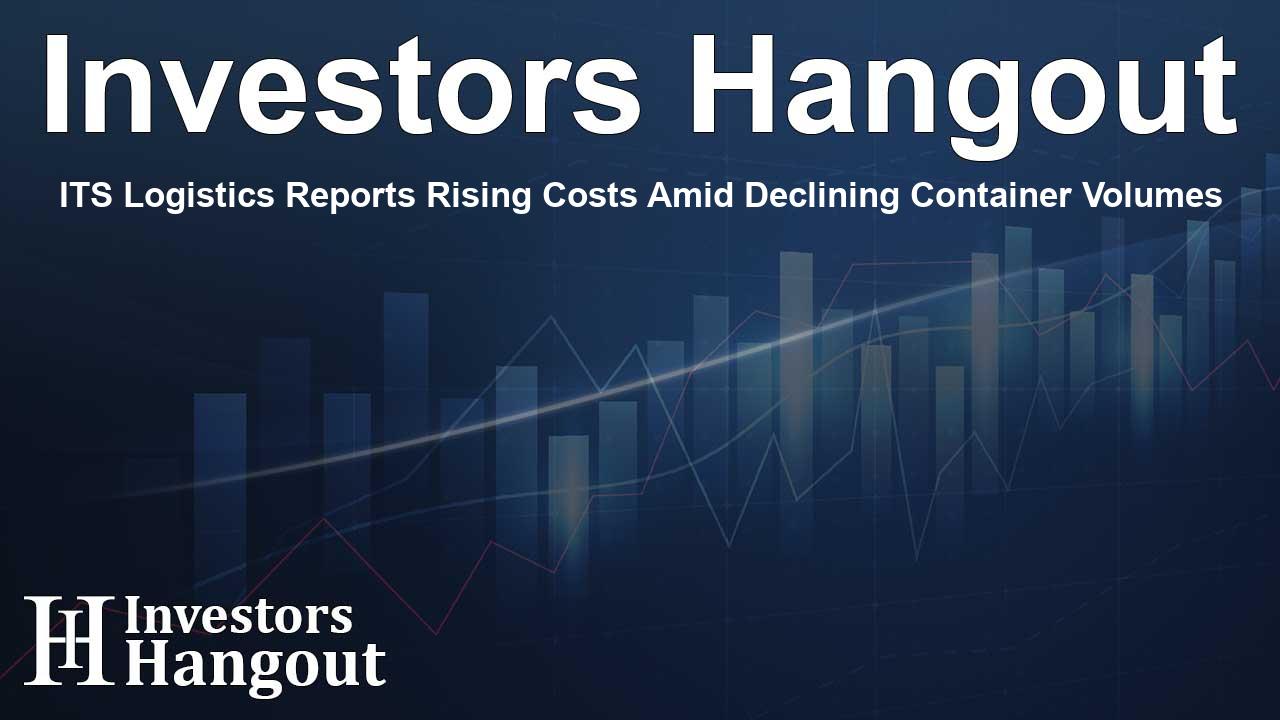ITS Logistics Reports Rising Costs Amid Declining Container Volumes

Rising Inventory Costs and Container Volume Declines
ITS Logistics has recently published its comprehensive Supply Chain Report, shedding light on the critical factors that are influencing the current landscape of logistics. During this time, inventory costs are showing an alarming trend of increase, while container volumes at major ports have dropped to levels unseen since the COVID-19 pandemic.
Understanding the Logistics Managers’ Index
The report highlights the Logistics Managers’ Index (LMI), which serves as a significant indicator of the health of the logistics sector, showing a persistent growth trend over two consecutive months. Chief Commercial Officer Josh Allen emphasized that while the index reflects growth, it is primarily driven by sharply increasing inventory costs.
Currently, the LMI is reported at 59.4, suggesting industry expansion, with concerns rising over inventory holding costs that have surged to unprecedented levels. Over time, while the demand for transportation should typically be on the rise, the data indicates that the Transportation Capacity Index is heading in the opposite direction, which raises serious questions about the efficiency and future stability of the transportation sector.
Port Container Volume Trends
Recent findings reveal a significant decrease in container volumes across the top U.S. ports, with an average decline of 10.7% recorded in just the last month alone. This drop was most notable in key facilities along the West Coast, where both the Long Beach and Los Angeles ports faced steep setbacks.
Impact of Tariffs on Import Volumes
This decline has been attributed not only to a natural correction following a period of heightened demand but also to the implementation of new tariffs that significantly affect import costs. As Allen pointed out, a direct link exists between the heightened tariffs on Chinese imports and the subsequent reduction in the volume of goods being brought into the country.
Currently, the logistics industry is facing a unique challenge, wherein even though capacity remains in an expansion phase, the discrepancies between upstream and downstream capabilities could indicate a troubling shift towards a tighter transportation environment.
Geopolitical Tensions and Economic Forecast
The ongoing geopolitical situation, especially tensions in the region concerning Iran, has further complicated matters. These circumstances are potentially capable of inflating oil prices, leading to increased operational costs for transportation providers. This surge could trigger inflationary pressures across the larger economy, posing additional challenges for both logistics operations and consumers alike.
Economic Indicators and Consumer Behavior
In the broader economic context, steady growth is still being observed, albeit with caution from consumers who are more mindful of rising costs. The economy is projected to grow at a moderate rate, with inflation trends showing gradual improvement. The core inflation rate is stabilizing around the 3% mark, providing some relief in terms of consumer pricing.
Continued Commitment to Comprehensive Solutions
In response to these challenges, ITS Logistics continues to offer a wide array of transportation solutions aimed at addressing complex supply chain issues. They pride themselves on their ability to serve a vast majority of the U.S. population within a two-day timeframe, leveraging their strong network capabilities.
The Role of the ITS Supply Chain Report
This monthly report serves as a crucial resource for ITS's employees and partners, blending data from various industry sources with insider insights. It aims to keep everyone informed of the changing dynamics within the marketplace.
Frequently Asked Questions
What are the main findings of the ITS Supply Chain Report?
The report highlights increasing inventory costs and a significant decline in container volumes at U.S. ports, indicating potential supply chain inefficiencies.
How is the Logistics Managers’ Index performing?
The LMI shows growth for two consecutive months, driven chiefly by rising inventory costs rather than increased transportation activity.
What impact do tariffs have on import volumes?
New tariffs, particularly on Chinese imports, have contributed to a noticeable reduction in U.S. import volumes, affecting overall logistics performance.
How are geopolitical tensions influencing logistics?
Tensions, particularly in the Middle East, are creating potential disruptions in oil supply, significantly raising transportation costs and impacting the logistics sector.
What services does ITS Logistics provide?
ITS Logistics offers a comprehensive range of transportation solutions, including drayage, intermodal services, and fulfillment solutions to cater to various logistical needs.
About The Author
Contact Addison Perry privately here. Or send an email with ATTN: Addison Perry as the subject to contact@investorshangout.com.
About Investors Hangout
Investors Hangout is a leading online stock forum for financial discussion and learning, offering a wide range of free tools and resources. It draws in traders of all levels, who exchange market knowledge, investigate trading tactics, and keep an eye on industry developments in real time. Featuring financial articles, stock message boards, quotes, charts, company profiles, and live news updates. Through cooperative learning and a wealth of informational resources, it helps users from novices creating their first portfolios to experts honing their techniques. Join Investors Hangout today: https://investorshangout.com/
The content of this article is based on factual, publicly available information and does not represent legal, financial, or investment advice. Investors Hangout does not offer financial advice, and the author is not a licensed financial advisor. Consult a qualified advisor before making any financial or investment decisions based on this article. This article should not be considered advice to purchase, sell, or hold any securities or other investments. If any of the material provided here is inaccurate, please contact us for corrections.
